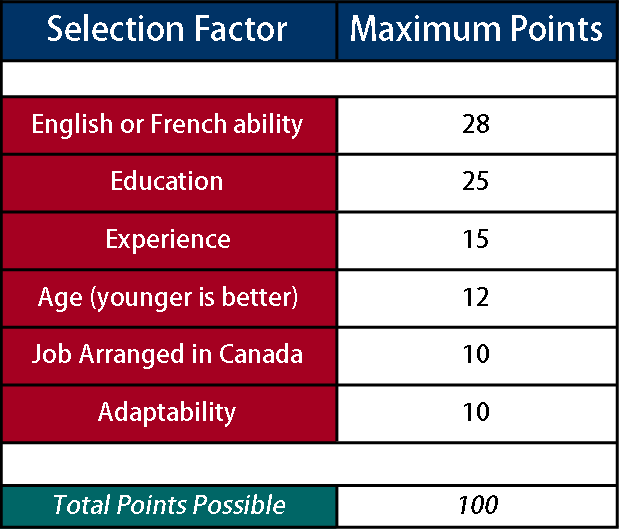Frequently Asked Canada Immigration Independent Class (Skilled Worker) Questions (FAQ)
> Immigration Categories > FAQ > Independent (Skilled Worker) Class
6.1 What documents must I submit?
Applications filed under the Independent Class generally include documents pertaining to the applicant's education and employment experience. During the process, applicants are required to submit statutory documents such as birth certificates, marriage certificates and certificates of non criminal conviction from each place of residence where an applicant has permanently resided for more than 6 months during the past 10 years.
6.2 What amount of assets do I have to possess?
In deciding how much of liquid assets (hard currency) an Independent (Skilled Worker) Class applicant or family needs in order to meet initial settlement expenses, it is generally recommended that the applicant be in possession of CAD$10,000, plus an additional CAD$2,000 per accompanying dependent. The ability to fund initial settlement coast without resource to social assistance is a question of admissibility.
6.3 Do professionals need registration and licencing to work in Canada?
In Canada, approximately 20 percent of occupations are regulated to protect the health and safety of Canadians (e.g., nurses, engineers, teachers, electricians). People who want to work in regulated occupations need to obtain a license from a provincial regulatory body. Applicants intending to work in one of these occupations may need to prove they hold sufficient credentials to meet professional licensing requirements. Licensing requirements often include education from a recognized school, Canadian work experience and completion of the exams. Fees for exams can be costly and are the responsibility of the applicant. Final assessment by the provincial authority can only be made once you are in Canada with permanent resident status. We will provide you with assistance in contacting the appropriate professional association in Canada to have your qualifications preliminary assessed.
6.4 Can I practice another profession than my "Intended Occupation"?
Yes, and furthermore, you might find that you could not practice your intended occupation right from the outset of your entrance to Canada, since some professions require licensing, and you would need to re qualify in the
province of your residence to practice your profession. Otherwise, there is no compulsion with regard to your occupation.
6.5 Is one year of work experience a requirement?
You must have the equivalent of at least one year's of full time employment experience in an occupation appearing on the General Occupations List to qualify for permanent resident status. Zero points of assessment are a bar to further processing unless the applicant has arranged employment approved by the National Employment Service in Canada and has a written statement from the proposed employer verifying that he or she is willing to employ an inexperienced person in this position. Work experience should be accumulated after the completion of a formal education in the field of occupation, or in a related field of occupation. Applicants destined to the Province of Quebec need only demonstrate six months of relevant work experience.
6.6 Is credit given for the part time experience?
Credit will be given for a part time experience as soon as total amount of it will be equivalent to at least one year of full time employment. In other words, two years of part time experience will suffice the minimum requirement of one year of full time experience.
6.7 Is credit given for experience obtained during post secondary studies?
Experience gained as part of post graduate studies may be credited towards the occupational experience if:
|
6.8 Is credit given for experience obtained during graduate studies?
Where an applicant with little or no post university experience applies for a Permanent Resident visa, particularly under an occupation where licensing or registration is required, a credit sometimes may not be given for experience obtained during post graduate studies. Given that most graduate level disciplines have a research component, such an applicant may be employable as a research assistant. The onus is on the applicant to demonstrate that he/she has sufficient experience during graduate studies as a researcher to warrant the awarding the points under the experience factor. In addition, the research performed may indeed provide acceptable experience for practice of the profession itself. However, should the experience prove to be exclusively academic or research nature only, credit will not be given for such experience in order to qualify for the occupation in question.
6.9 How is experience in a previous or current occupation assessed when that occupation differs from the applicant's intended occupation in Canada?
Under the "transferability of experience" rules, experience gained in another profession counts toward the assessment of experience in the intended occupation in Canada, only if the duties performed in the former profession are consistent with those associated with the intended occupation.
6.10 Must I have a Canadian offer of employment to qualify as an Independent Class immigrant?
You are not required to obtain an offer of an employment to qualify as a Skilled Worker. The current Canadian immigration policy provides that if an applicant meets the selection criteria, he/she is likely to become successfully established in Canada. However, "arranged employment" will provide a prospective applicant with an additional 10 units of assessment and is sometimes an important aspect of the selection process.
Home | Who We Are | Services | Immigration | Employment | Retain Us | Archive | Links | Navigation
Business Profile | Professional Credentials | Client References | Contact Information | Index of Topics | Search

